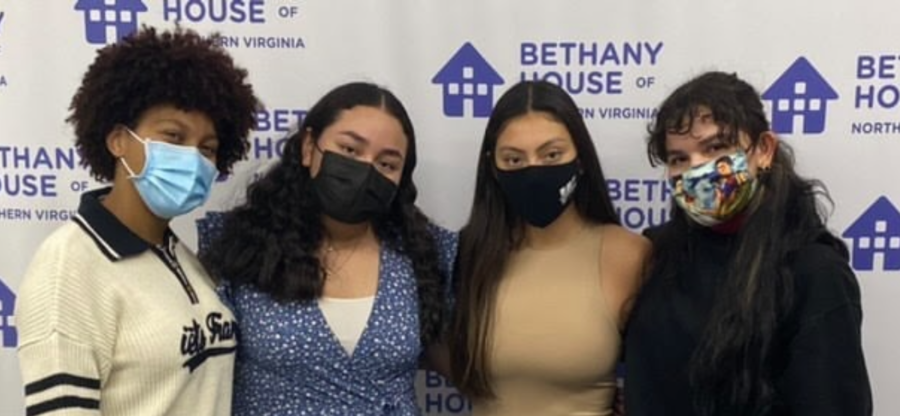Menstrual product advocates ask APS to go with the flow
Senior Maha Yazdani proposes feminine sanitary products be moved from the nurse’s office to bathrooms to prevent sanitary and educational disruption.
Members of Flo For All collected feminine products as part of an initiative. The organization’s DMV branch donates 3,000 pads to women’s shelters for their first drive.
Every woman has experienced that awkward moment when their period did not line up with their schedule. Sometimes, however, it may align with their first-period class. Senior Maha Yazdani understood that universal struggle and decided to make a change.
Here at the school, you can sign Yazdani’s virtual petition to install female sanitary product dispensers in every women’s bathroom, whether that means metal boxes or wicker baskets. Out of ten public women’s washrooms — two on each floor — only the third floor bathroom on the right side of the main stairwell is equipped with a dispenser. One tampon costs 25 cents and saves you the uncomfortable trip across school and down and at least one flight of stairs to the school nurse’s office.
“I think that moving [pads and tampons] to the bathroom should make them more accessible and reduce some embarrassment [for] students who need them,” nurse Darci Niestroy said.
Right now, Yazdani has over 300 signatures in support of the installation, the majority of which are from students at the school. Some teachers also signed the petition, one of the more politically and socially woke ones to do so was International Baccalaureate (IB) Social Anthropology teacher Daniel Moses. Mr. Moses was passionate about systemic gender inequality and pondered where it stemmed from, which led him to sign in favor of Yazdani’s initiative.
“My understanding is that the initiative is designed to place importance on women’s menstrual products, women’s health needs in general, as compared to general health,” Mr. Moses said. “And I hope that those are providing equal premium.”
Although Mr. Moses had not met Yazdani prior to her approaching him about the petition, he found her bright and inquisitive nature to be refreshing in a time which calls upon the younger generation to create change on their own.
“There is non-overt sexism in our society,” Mr. Moses said. “As somebody who wants to be better educated on these issues and also wants to promote gender equity, I think it is really important, regardless of whether it directly impacts me as an individual, I advocate on behalf of my students.”
Unfortunately, this matter is not as simple as adding dispensers to the bathrooms here at the school. The issue of gender inequity has been ingrained into our public health and economic systems. Countless feminine hygiene product drives have been held by students who, after only menstruating for less than a decade, recognize the inefficient cost and accessibility provided to women. However, this is not an unsolvable problem. If the need for accessible feminine sanitary products were given the recognition it deserved as a female rights cause and if people were not afraid to speak openly and advocate for women’s needs across the gender spectrum, perhaps Yazdani would not have needed to start her petition to draw attention to a basic need of half of the population.
“We are in the 21st century, periods shouldn’t be a taboo thing to talk about,” Yazdani said. “And it is not something that we need to hide or sneakily tuck away to bring to the bathroom or go to the nurse and ask her.”
When, during a trial period in 2020, a basket of pads and tampons were placed in the restrooms at the school by members of the clinic, they very quickly disappeared. Although this could have been caused by theft or vandalism, another idea struck the staff. Perhaps there was not enough accessibility to free products throughout the school day or at students’ homes.
“My first goal is W-L, because it affects me and the Generals the most. I know that Wakefield has dispensers, but they cost 25 cents, and they never really work,” Yazdani said. “Another goal that I want to tackle after getting W-L to do it would be trying to get all of the high schools to also have them.”
While principal Antonio Hall voiced support for the cause in a brief conversation, we were unable to sit down for a full interview due to scheduling conflicts. Yazdani initially spoke to Mr. Hall on August 30, the first day of the 2021-2022 school year. Although Mr. Hall was receptive to her ideas, Yazdani decided that she needed to better represent the school student body by gaining the written support of those who supported this change.
“So I was like, ‘you know what, let me go back and gather some data, like a petition and the survey, go back to [Mr. Hall and] present my argument professionally,’” Yazdani said.
The main concern about implementing these products presented by the janitorial staff was budgetary constraint. Although the hygiene products at the nurse’s office had been paid for, there was no funding for the dispensers Yazdani suggested. This would likely come from the sanitation department budget, which is already responsible for the maintenance of the bathrooms themselves as well as the entire school. However, the actual cleanliness of the school was not a topic of scrutiny by the janitorial staff. The third floor women’s bathroom, the only one that provides feminine products, was reported to be just as capable of the proper disposal methods and cleanliness as any other.
“If you have better ideas, you know, let us know,” maintenance supervisor Jose Moreno said. “I am always thinking, ‘Oh, can we make [the issue of sanitary products] better; how can we?’ I know it is not going to get fixed 100%, but we can try to minimize it.”
The Arlington Public School (APS) School Board must meet and discuss the potential consequences of these dispensers before any action can be taken beyond that of the school administrators personal opinions. However, if the board were to reject the proposal it would pose a huge obstruction to female rights within APS. A public school should guarantee these necessities as they do running water, toilet paper, hand soap or any other sanitary necessities.
“I don’t know exactly what it means to be successful for [Yazdani], if it is just the administration responds and begins providing the feminine hygiene products or whatever else would be helpful, I think that that is great,” Moses said. “But let’s be honest, your real cause, I mean the real root of the problem, is ingrained sexist mindsets within our society.”
Link to the petition:













